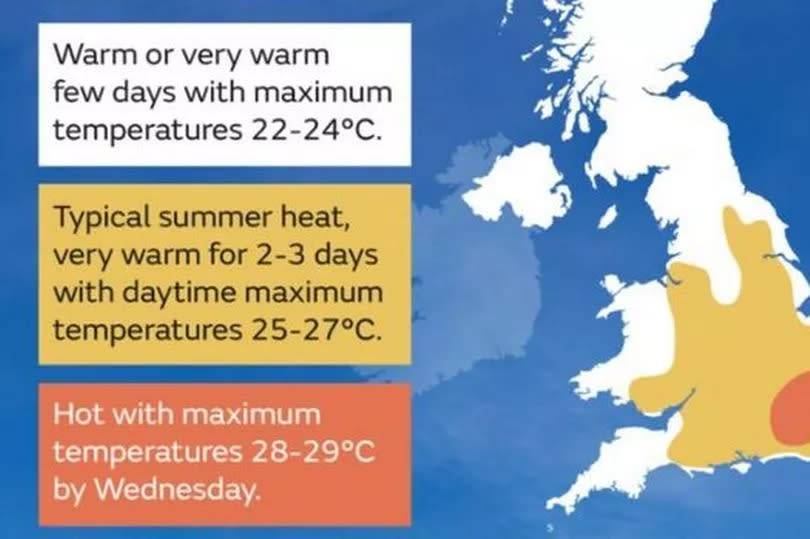UK heatwave alerts from Met Office and Health Agency ahead 29C temperatures

The UK is set to sizzle as temperatures are predicted to soar to a sweltering 29C, prompting the Met Office to issue an urgent 96-hour yellow health alert. Weather maps have turned a fiery red as the country braces for the intense heatwave expected to hit in just a few hours.
Forecasters have issued stark warnings of a potential "increase in mortality across the population" from tomorrow until Thursday.
The UK Health and Security Agency (UKHSA) has cautioned that the extreme June heat could pose a significant risk to vulnerable individuals, with nearly every corner of the nation preparing for the scorching weather.
Read more: Heatwave health tips
Heat alerts will be in effect for all regions of England, bar the north east which is under a green alert, from Monday, June 24, impacting eight areas from the early morning, reports the Express.
Yellow warnings, jointly issued with the Met Office, suggest that while the heat is "unlikely to impact most people", those with multiple health conditions and on medication may struggle to cope.
These warnings indicate that measures might need to be taken "within the health and social care sector specifically" and encourage individuals to take additional precautions to avoid the worst of the heat.
Dan Rudman, Deputy Chief Meteorologist at the Met Office, stated: "Heatwave conditions need to remain in situ for three consecutive days, and by the beginning to middle of next week it is possible that some parts of the UK could be reaching heatwave thresholds."
"However, whether or not everyone experiences heatwave thresholds, the majority of the UK will experience the highest temperatures so far this year."
The severity of yellow warnings sits above the green "summer preparedness" alerts and one notch below the amber "enhanced response" alert on the UKHSA's scale.
Before this drastic shift in the weather hits, the RNLI urges those planning to enjoy the water to exercise extra caution. Samantha Hughes, the National Water Safety Partner at RNLI highlighted: "Entering the water during warm weather can increase the risk of cold water shock due to sudden changes in skin temperature. To reduce your risk of cold-water shock, enter the water gradually and avoid jumping or diving straight in".

 Yahoo News
Yahoo News 
